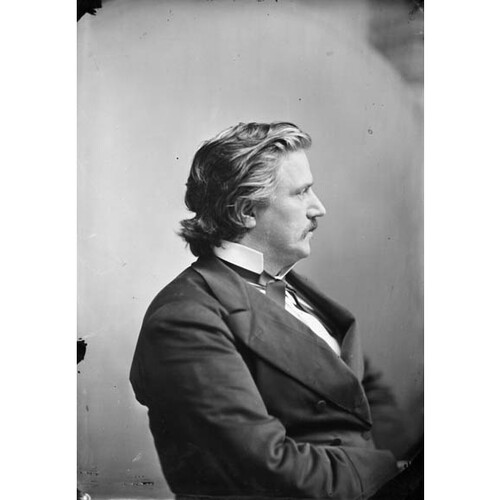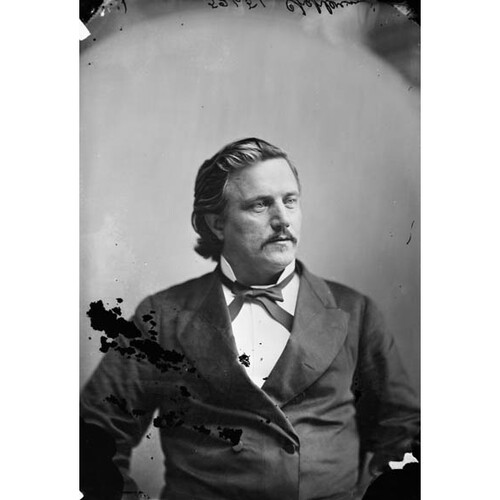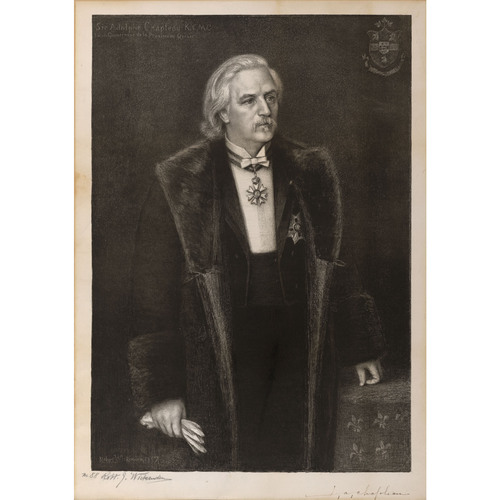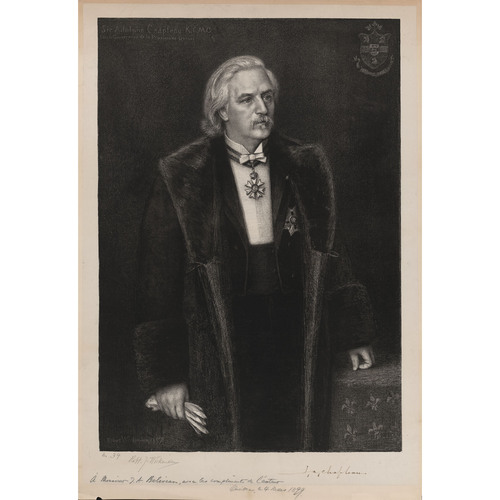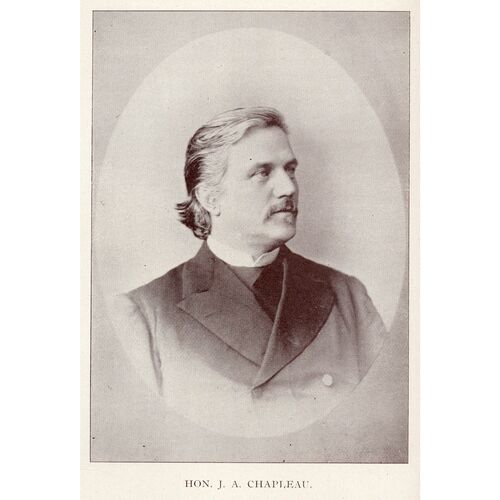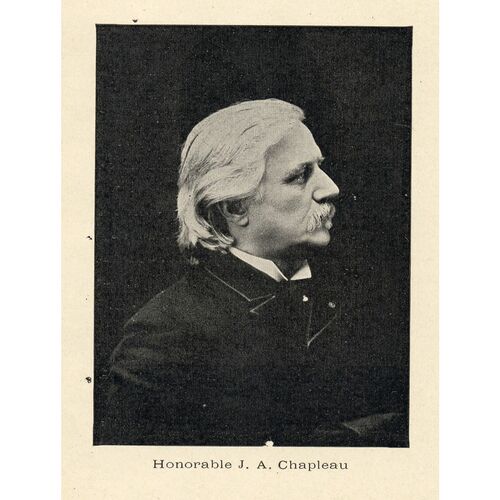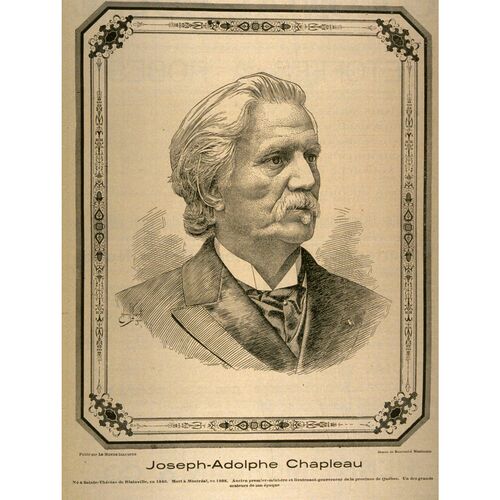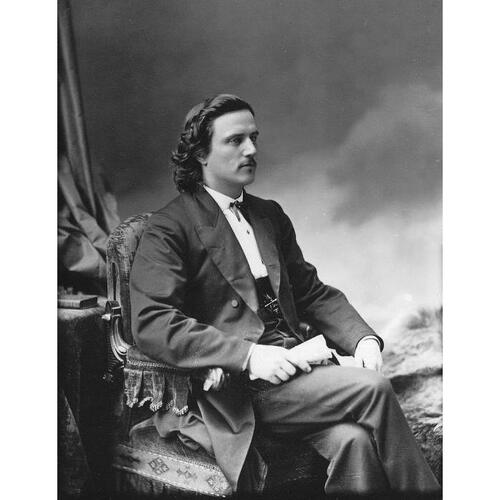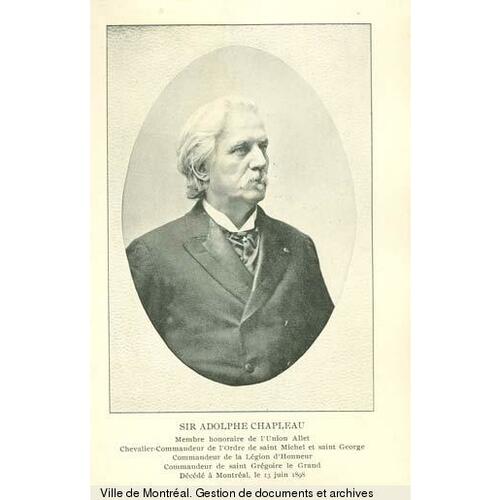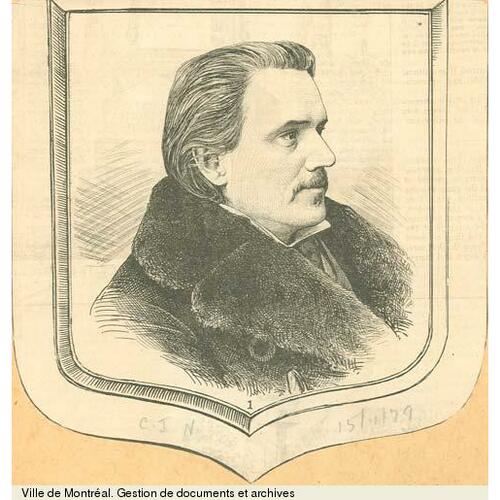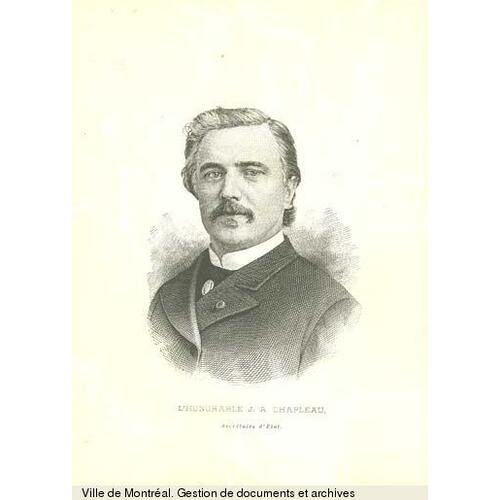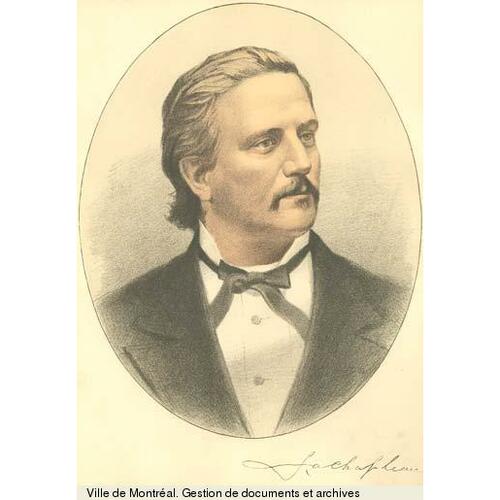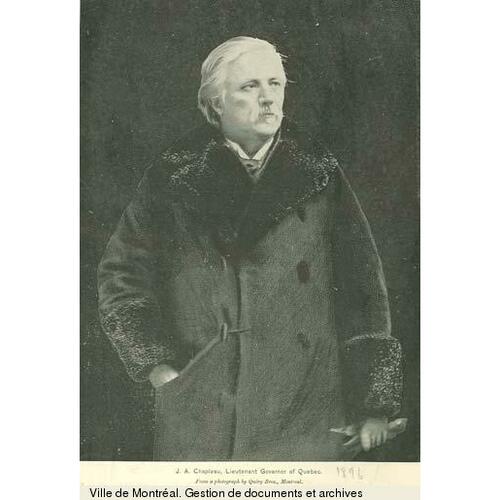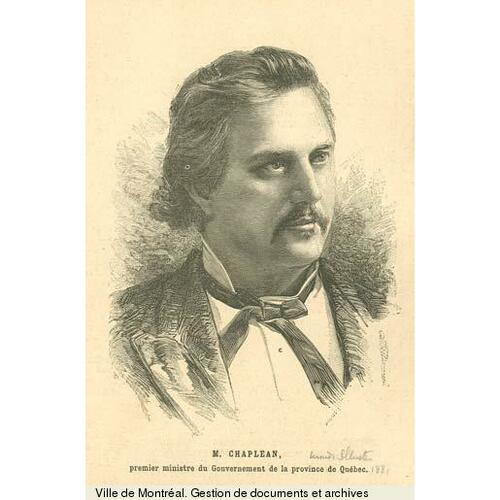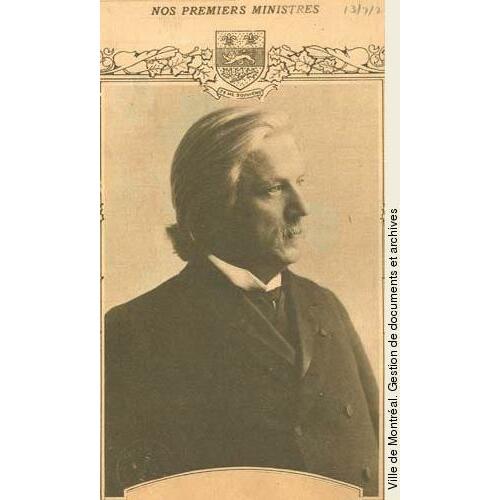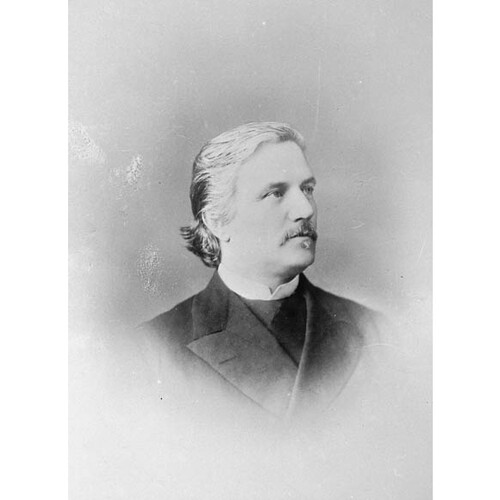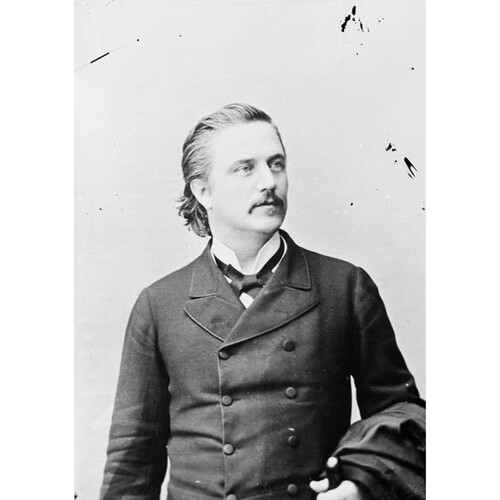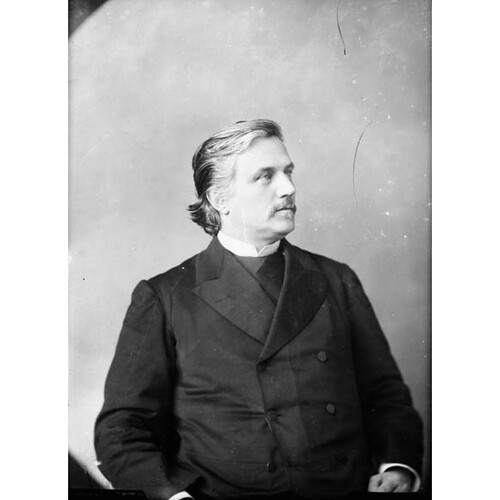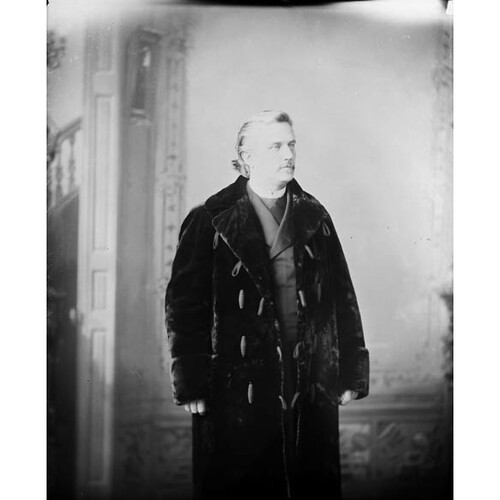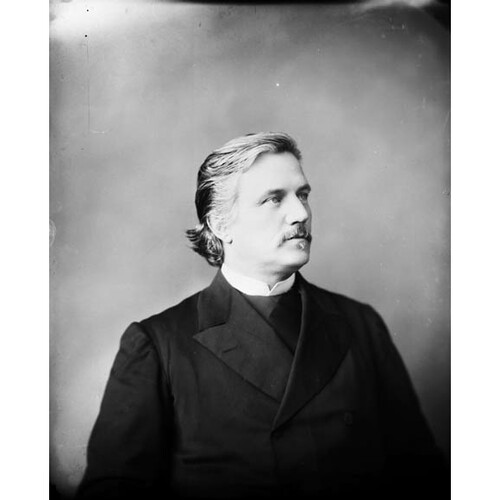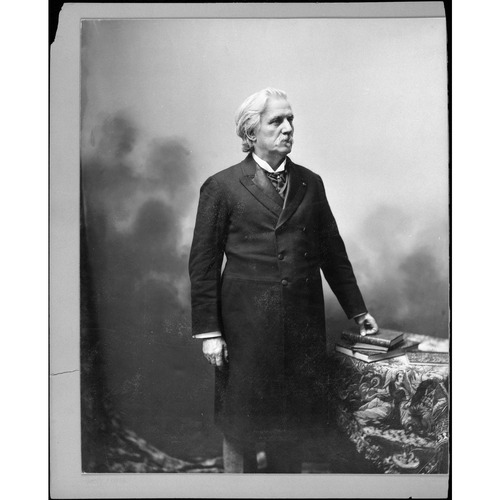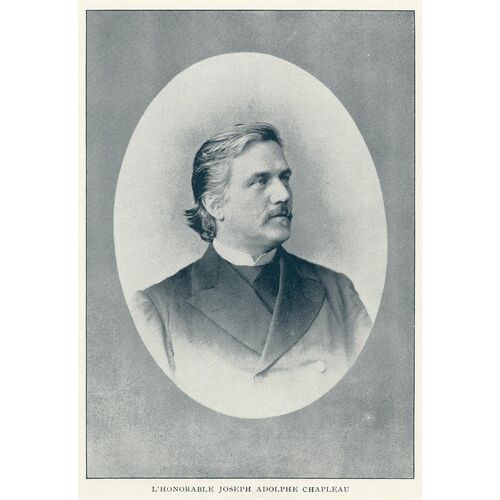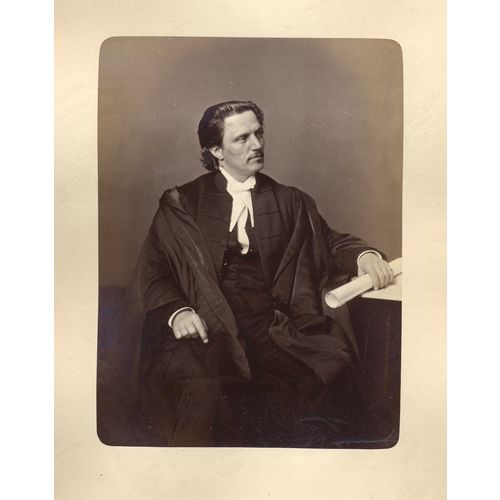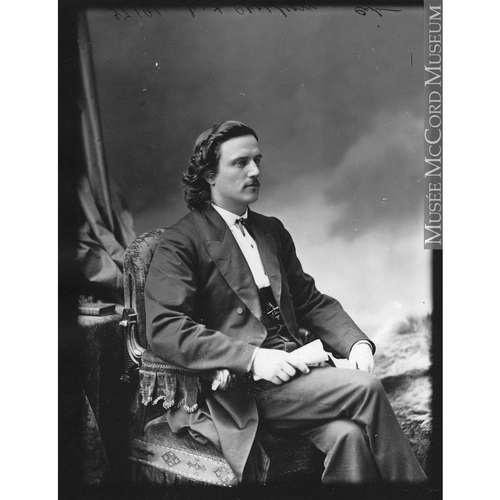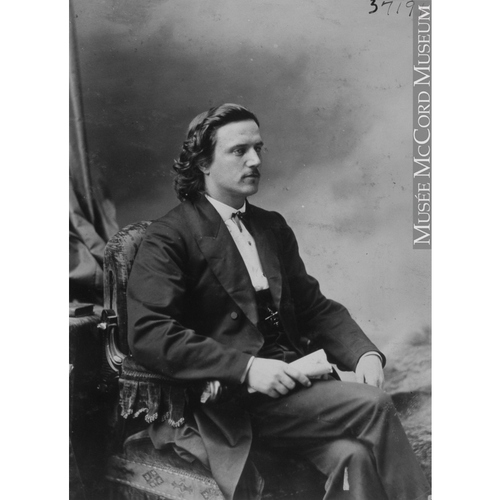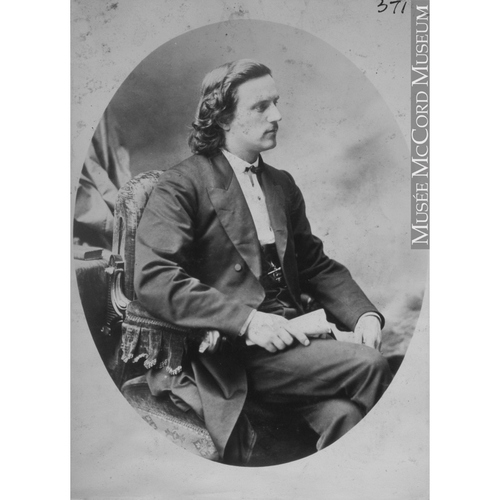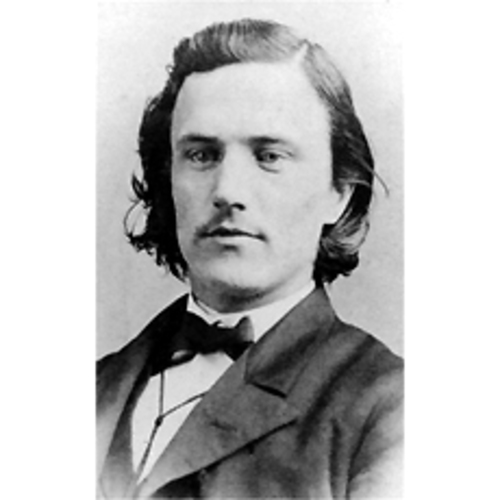As part of the funding agreement between the Dictionary of Canadian Biography and the Canadian Museum of History, we invite readers to take part in a short survey.
CHAPLEAU, Sir JOSEPH-ADOLPHE, lawyer, publisher, politician, newspaper editor, and office holder; b. 9 Nov. 1840 in Sainte-Thérèse, Lower Canada, son of Pierre Chapleau and Zoé Sigouin; m. 25 Nov. 1874 Marie-Louise King in Sherbrooke; they had no children; d. 13 June 1898 in Montreal, and was buried there three days later.
Joseph-Adolphe Chapleau belonged to the eighth generation of the family in Canada. His ancestor Jean was born in 1626 to Jean Chapeleau and Françoise Brochard in the parish of Les Brouzils (dept of Vendée). In the mid 17th century Jean emigrated to New France and settled near Quebec at La Canardière. There he worked as a master mason and on 26 April 1654 married Jeanne Gagnon, who came from the bishopric of Poitou. The six children born of this marriage established themselves more or less in the vicinity of Quebec, depending on the opportunities afforded them by the full-scale effort late in the 17th century to settle and develop the colony. A descendant of the Chapeleaus was among the first residents of the seigneury of Terrebonne. Joseph-Adolphe probably came from this line; his family was from the village of Sainte-Thérèse in the domain of Blainville, a part of the seigneury of Mille-Îles that adjoined Terrebonne. His father was a quiet contractor and mason, a “stone cutter.” Six feet tall, Pierre Chapleau commanded respect for “his scrupulous integrity” as well as “his sympathetic and expressive mien.” Joseph-Adolphe would remember him as a man who was content all his life “to work, love, and pray,” and who was “an honourable representative of Canadian working men.” His mother was a remarkable woman who, according to Arthur Dansereau*, a close family friend as well as Chapleau’s personal adviser and political ally, passed her most striking gifts on to her son.
The Chapleaus were of modest means, and, as was then common, they suffered the ravages of tuberculosis. Two children, Henri and Philomène, died of it in the prime of life. There is no indication that Joseph-Adolphe was affected, but he was always in delicate health, caught cold at the slightest chill, and had to take frequent rest cures.
While still a child, Joseph-Adolphe showed himself to be intelligent, lively, and curious. He had a taste for learning. His parents found the means for him to study at an advanced level, thanks to the Masson family. After attending the village school in Sainte-Thérèse, he entered the Collège Masson, which at that time provided a classical education. This institution had been founded through the generosity of Joseph Masson*, the seigneur of Terrebonne. Since his death in 1847 his widow, Marie-Geneviève-Sophie, had continued to maintain it as a family property. She also assisted young men of humbler families who were recommended to her because they seemed destined to attain high status in society, whether through the priesthood or politics. Influenced by her, Joseph-Adolphe went on to do the final two years of the classical program (Philosophy) at the Séminaire de Saint-Hyacinthe. A decade earlier, at the suggestion of Bishop Ignace Bourget*, she had made the same choice for her son Louis-Rodrigue*. Young Chapleau, who was immensely talented, benefited from an education reputed to be excellent and regarded in Lower Canada as a bulwark against Anglo-Saxon values. The Séminaire de Saint-Hyacinthe was indeed “a centre of national education and patriotic sentiment.” Many of the right-thinking bourgeoisie of Lower Canada were educated there.
On finishing his studies Chapleau chose the law. He received his training with Montreal lawyers Gédéon Ouimet*, Louis-Siméon Morin*, and Louis-François-Wilfrid Marchand and was called to the bar of Lower Canada on 2 Dec. 1861. He had just reached his majority. Chapleau immediately started practising in Montreal and went into partnership first with Ouimet, who had introduced him to the study of law at Moreau et Ouimet. In the course of his career he worked in succession with Joseph-Alfred Mousseau*, Edward Carter, Levi Ruggles Church, Albert William Atwater, and Charles Champagne, as well as with the firm of Moreau, Archambault, Nicolls et Brown. Chapleau specialized in criminal law. During 15 years of practice he had 22 murder cases and won 21. In the court-room he spoke with intelligence and sensitivity. He also made good use of dramatic effects, which were commonly employed at that time. Laurent-Olivier David* describes him in court: “His pale, attractive face framed by the long hair he let hang loosely about his shoulders, the manner in which he draped himself in his gown, his melodious voice, and his touching, passionate appeals for pity, for mercy, had a miraculous effect on the jury.” Chapleau acquired a reputation singling him out from the lawyers of his own age. But his temperament demanded something more.
In 1862 Chapleau and his friends Ludger Labelle*, Louis-Wilfrid Sicotte, Joseph-Alfred Mousseau, and Laurent-Olivier David founded Le Colonisateur in Montreal. These young intellectuals believed they had a mission and sought to make a name and place for themselves in the controversies of the day. But their venture proved brief: the newspaper published its last issue on 27 June 1863.
Chapleau was soon tempted by politics. When he was 19, he had participated in some electoral campaigns, and he hankered after such battles, in which passion dominated, often in an excessive and brutal fashion. In Chapleau’s milieu in Montreal, politics was ever present in conversations and since the early 1860s it had been the source of deep anxiety. The united province of the Canadas had never been sturdy, but it was then on its last legs, and the legislative autonomy of Lower Canada was in danger. People in Chapleau’s circle questioned whether attacks from Upper Canada and its demand for representation by population would not in the end destroy Lower Canada as a distinct entity. The need for fundamental constitutional reform was being felt, and there was a readiness to go to great lengths to achieve it.
The era of Canadian confederation opened in 1864 in this context of sectional antagonism. The project put pressure on all nationalists to involve themselves according to their talents, for, the thought was, “better a confederation imperfect in form than a legislative union of the Canadas with representation based on population.” Thus Chapleau decided to enter politics in order to support confederation and back the Liberal-Conservative party of George-Étienne Cartier* and John A. Macdonald. In doing so he broke with a section of the young Conservatives who were in revolt against Cartier.
Shortly after confederation came into being on 1 July 1867, elections were held for the House of Commons and the Legislative Assembly of the province of Quebec. Louis-Rodrigue Masson ran for the commons in Terrebonne and he contemplated representing the constituency in the provincial legislature also. Many of his political friends would hold seats in both federal and provincial houses, there being no obstacle to the double mandate in the province. He had the backing of Cartier, who wanted a sure winner in the riding, held by the Rouges since 1861. In 1865 its member, Louis Labrèche-Viger*, had voted against confederation. Chapleau, disregarding his debt to the Masson family and Cartier’s desire, managed with some scheming to obtain the provincial seat himself. His career thus began with a show of insubordination towards his leader and of independence towards the Massons. His commitment to the Liberal-Conservative party and to confederation was not, however, diminished. On the day he was acclaimed in Terrebonne, against Cartier’s wishes and orders, he came to the assistance of his leader, whose own election was in jeopardy. At a public debate the workers of Montreal East, who had been thrown into a state of agitation by Médéric Lanctôt* and the opposing candidate Ludger Labelle, prevented Cartier from gaining a hearing. Chapleau rushed to the platform. After an hour-long speech about his leader’s qualities and the advantages of confederation, he was applauded. When Cartier came to thank him effusively, Chapleau replied, “Don’t mention it, Monsieur Cartier, I didn’t do it for you.” The incident gives a glimpse of the Chapleau who for 25 years would be a leading Quebec and, later, Canadian politician: devoted, loyal, firm, proud, sometimes abrupt and irritating. It also reveals his talent as an orator, which was the talk of political circles and of the legislature before he even entered it. Premier Pierre-Joseph-Olivier Chauveau* had him present the address in reply to the speech from the throne. Chapleau used this solemn moment on 30 Dec. 1867 to issue a call for unity. “We stand at the cradle of a new constitution; around a cradle passions are stilled, divisions vanish, giving place to feelings of love, to plans for glory and for the future.” He would repeat this appeal often in the course of his political career, which was played out in three acts: from 1867 to 1882 he sat in the Legislative Assembly of Quebec, where he climbed all the rungs; from 1882 to 1892 he was in Ottawa as the member for Terrebonne and a minister of the crown; from 1892 to 1897 he served as lieutenant governor at Spencer Wood.
When he first entered the Quebec legislature, Chapleau was not a star. The average age of the members was 42; he was only 26. Of his new colleagues, 19 had already sat in the assembly of the Province of Canada; he had no parliamentary experience. Many of them were renowned; they were also members of the House of Commons and even ministers, they had connections with the business world, or they had had a military career. All that Chapleau brought were his few years in legal practice, his experience at Le Colonisateur, his professional ties with Gédéon Ouimet, attorney general in the new Chauveau government, and his friendship with some of the other assemblymen. But he possessed gifts that were universally recognized. Also, he was ambitious. In consequence, he paid close attention to all the debates engaging the house before taking part himself.
During his first term in the assembly, from 1867 to 1871, Chapleau committed himself, however, on the school question, thereby revealing a nationalist sentiment that, although prudent, was strong. The issue was a thorny one, which the last government of the province of Canada had not managed to resolve. Hector-Louis Langevin*, who claimed to be settling it for Lower Canada in the 1866 session, was obliged to withdraw his bill, thus causing the resignation of the spokesman of the Protestant minority in Lower Canada, minister of finance Alexander Tilloch Galt. Immediately after confederation, Joseph Cauchon* was forced to forgo the honour of forming the first provincial government because his fierce opposition to the Langevin bill a year earlier had so alienated the Protestant minority in the province that no English-speaking member would agree to serve in his cabinet.
The school question was a priority for Premier Chauveau, who was also minister of public instruction, a post created in 1867. Lobbies were reminding him insistently that Cartier had publicly promised to get the Quebec government to put in place legislative measures on schools that would satisfy the Protestant minority. Chauveau was asked to follow up on the Conservative leader’s promise. Consequently, on 19 March 1869 he introduced his school bill, which was signed by the lieutenant governor on 5 April. The new statute was well received by Protestants, for it granted them the privileges they had been demanding for years and had almost secured on the eve of confederation. They obtained control of their schools and a more adequate system of financing them. Clearly a law so favourable to the Protestant minority was the price paid for confederation and for political and social peace in the new province. The law was also proof that no one could govern at Quebec without making large concessions to the English-speaking element, given its dominance in the provincial economy.
The Chauveau cabinet’s liberality was not accepted unanimously by Catholics. There was criticism in the French Canadian press as well as in the legislature. Chauveau had anticipated – as had Cartier and Langevin, the leading members of the ministry – that Cauchon would open the debate. He could not let a measure be passed that, in some ways, was an exact copy of the Langevin bill of 1866. Chapleau spoke in the same vein as Cauchon, denouncing the privileges accorded to the Protestant minority and the dangers of such generosity on the government’s part. Under the circumstances, this first position taken by Chapleau was courageous, although it was not rigid. It proved that the young politician already could stand against those who crossed him, even though it was they who held the key to his political future. He displayed the same independence in 1870, when he voted against the double mandate because it might cause the Legislative Assembly to follow the lead of the House of Commons and could thus be a threat to provincial autonomy.
Chapleau was returned for Terrebonne by acclamation at the Quebec elections in the summer of 1871. Masson had again found the provincial scene tempting. Since federal elections were also coming up, for the sake of peace in the riding the two men, adopting a tactic common at the time, agreed to support each other. In the Quebec legislature the atmosphere was no longer that of 1867. The Conservatives still held a majority, but the ultramontanism expressed in the Programme catholique [see François-Xavier-Anselme Trudel*] was splitting the party into two wings. Chapleau did not personally have to confront an opponent espousing the doctrine. He did, however, have to define his position. He was a Liberal-Conservative; he preached separation of church and state, with obedience to “the secular authority” in civil matters and to “the spiritual authority” in religious matters. There was nothing of the extreme right-wing Conservative or the ultramontane in him.
Regionalism also split the Conservatives. Since the formation of a Quebec government, local interests had become more clearly defined, with the regrouping of the members of the Legislative Assembly and the emergence of district leaders. In particular Montreal and Quebec confronted each other within the party. Chapleau was not the official representative of the Montreal region, but in fact he was its most ardent and authoritative defender. After Cartier’s death in 1873, the party’s new leader, Langevin, charged him with forming a Conservative association in the Montreal region, undertaking himself to organize a similar one for Quebec. The Conservatives who had been “hesitant” until then followed Chapleau, especially the young ones, who were slightly left-leaning like him. Unwittingly, Langevin was setting a trap for himself, since this initiative was the start of the long rivalry that would mark the two men’s political careers.
At the same time many Conservative assemblymen were challenging the Chauveau cabinet, which was proving administratively feeble. They also opposed the double mandate, which facilitated the intervention of the federal government and in effect undermined the province’s autonomy. Chapleau participated in this dual protest, thereby ensuring his political advancement. After Chauveau was forced to resign in 1873, Gédéon Ouimet became premier. On 27 February he made his disciple Chapleau solicitor general.
Chapleau thus found himself implicated in the Tanneries scandal which rocked the Ouimet ministry in 1874 [see Louis Archambeault*]. The cabinet had hastily voted to exchange a plot of some 25 arpents in the village of Les Tanneries for another of about 40 arpents on the Coteau Saint-Pierre. The transaction was denounced as detrimental to the province. The Ouimet government was accused of having played into the hands of land speculators and of having parted with a property worth $200,000 for half of another, worth about $20,000. There was also a revelation of influence peddling in which Chapleau’s friend Dansereau supposedly had had a very active role. Ouimet handed the reins of power to Charles Boucher* de Boucherville on 22 September, and the new premier surrounded himself with men who had not been touched by the scandal but who did not have enough in common to constitute a strong government.
The ensuing inquiry established that the Tanneries deal had been corrupt and recommended that the sale be cancelled. The investigators showed that Dansereau had profited from information through Chapleau. Guilty or not, Chapleau was compromised, and this fact could have checked his political momentum. But the province of Quebec had a dearth of promising men, and Ottawa was already recruiting a great many of them.
Two other important events in Chapleau’s life occurred in 1874. He came out of them better equipped in various respects. In October he was designated as the lawyer to defend Ambroise-Dydime Lépine* and his Métis companions, who had been arrested in connection with the death of Thomas Scott* in 1870. Chapleau did not overcome English fanaticism in Lépine’s case, but he was more fortunate with regard to André Nault* and Elzéar Lagimodière. He had travelled to Winnipeg at his own expense and argued the cases without fee. It is clear that Chapleau shared in the ethnic nationalism of his time, which, among other characteristics, saw a mission to propagate French culture and the Roman Catholic faith on an Anglo-Saxon and Protestant continent as divinely ordained. From this perspective, the province of Quebec had to assume responsibility for the Métis community in the west and give it all the means, first to survive, and then to develop, through a wave of settlement moving out from the shores of the St Lawrence. Ethnic solidarity, then, underlay Chapleau’s intervention on behalf of the Métis. But the gesture was not entirely disinterested. A trip west was an adventure dreamt of by many young men who, like Chapleau, had known Louis Riel* when he attended college in Montreal. In addition, participation in a trial that was making headlines in the press across the country could not help but consolidate a political career.
No sooner had Chapleau returned from Winnipeg than he married Marie-Louise King, daughter of Lieutenant-Colonel Charles King, a distinguished soldier who had been born in England and had come in 1860 to live at Sherbrooke, where he became a wealthy land speculator. Marie-Louise was an accomplished young woman who had been educated in a convent although she was Protestant. She spoke excellent French, was a musician, and had a fine voice trained from early youth. Chapleau had met her the year before at a concert in Montreal. It was thus music that first brought them together, for Chapleau himself was a musician when he was in the mood and sang “the old songs of France delightfully.” Through this marriage he acquired the means both to pay for his pleasures in life – always numerous – and to win “the favour of important people.”
Boucher de Boucherville, a supporter of the Programme catholique, and Chapleau were not friends. Political pressures, however, forced the premier to facilitate Chapleau’s rise. On 27 Jan. 1876 he even made him provincial secretary. Chapleau accepted the job, though with one eye on Ottawa. He dreamt of a “change of scenery and actors,” and assuredly of a more prestigious stage for his talents. But at that time there was no immediate future for a Conservative in Ottawa. By contrast, Quebec held in store for him a fight of the kind he loved, when the ministry of Boucher de Boucherville was dismissed by Lieutenant Governor Luc Letellier* de Saint-Just on 2 March 1878 and a Liberal government was formed and then confirmed in power in the following elections. In Ottawa, however, the Conservative party regained power on 17 Sept. 1878. There were two promises in its electoral program: the introduction of a National Policy in economic matters, and the removal from office of Letellier de Saint-Just. The new Macdonald government immediately went to work implementing tariff protection [see Sir Samuel Leonard Tilley] but put off settling the fate of the lieutenant governor. Chapleau thought “strong pressure” had to be brought to bear on Sir John regarding the Letellier affair, for “left to himself, he will get cold counsel from the English side and things will drag on.” He was convinced that the fate of the Conservative party at Quebec was linked to the resolution of the matter. As a sort of offhand joke Chapleau predicted in a letter: “At this moment Spencer Wood is a real barometer. If the old man goes out, it’s fine weather, if he stays in, it’s bad! And to think that it’s you in Ottawa who control the climate.” Chapleau led the fight against the scheming of Macdonald, who was being influenced by various groups in Ontario. He upheld his friends in Ottawa when they intervened with the party chief, reacted to every episode in the affair, calmed the members of the Club Cartier when they called for the collective resignation from the federal government of the Quebec ministers, lost patience when the solution was slow in coming, backed Langevin, who was in England playing the most important role in the dénouement of the drama, and rejoiced at last when the removal of the lieutenant governor from office was announced on 25 July 1879.
Chapleau consequently came out of the Letellier crisis with new strength. He had his eye more firmly fixed on Ottawa and he lost no chance there to tout his own abilities. But before moving on to the federal scene, he set himself the task of restoring party unity and bringing the province back into the Conservative fold. To achieve the second goal, with the help of the party’s financial backer, Louis-Adélard Senécal*, he gained the support of the Legislative Council, which refused to vote supply. The council’s coup d’état was the reply to Letellier’s; it brought down the Liberal ministry of Henri-Gustave Joly*.
On 31 Oct. 1879 Chapleau became premier of the province, at the age of 38. A skilful politician, he was almost as good at handling men as words. But since he lacked a reliable majority in the house, to give the province good government he needed a coalition that would bring together the moderates in both parties. From the time of confederation the idea of such a union had surfaced regularly. It was seen as the basis for a strong ministry and the condition for provincial autonomy.
Thus, when he came to power, Chapleau took the first step towards a coalition with the members of the Liberal right wing. He had Mousseau, then a Conservative mp, approach Honoré Mercier, who had been the leading light of the Liberal party since the fall of the Joly government. The idea appealed to Mercier. The two leaders had common professional and political roots, and although they had taken different paths, they remained good friends. Under these circumstances, forming a coalition cabinet was more feasible than ever. As long as the negotiations were secret, Chapleau remained hopeful, even though the Liberals were setting stiff conditions, among them the abolition of the Legislative Council. But when the discussions became known, the ultramontanes went on the attack and demanded preservation of the provincial and federal upper houses as bulwarks against liberalism. Once more the attempt to unite moderate Conservatives and Liberals met with failure. Chapleau tried again in 1881. He encountered a similar set-back. Mercier had more luck in 1886. However, his Parti National outlasted by only a few years the collective emotional turmoil stirred up by the hanging of Riel.
Chapleau’s time at the helm of the province was brief. He took the premier’s seat in the legislature on 28 May 1880 and he held it during the 1881 session. Although his party won the elections on 2 December of that year with an overwhelming majority (they won 49 of 65 seats), he went through a difficult session in the spring of 1882 and was compelled to leave Quebec for Ottawa in July. Thus his term as premier was both short and tumultuous. The difficulties came not only from the Liberal opposition, as was to be expected, but also from his own party, for the ultramontanes in it distrusted their leader and kept a very close eye on him.
At the outset of the 1880 session Chapleau had occasion to test his power. On 2 June the Liberals, who had fallen victim to the Legislative Council a few months earlier, introduced a motion to refer the abolition of the council to the queen. They had the backing of nearly all the English-speaking population and even of the Conservative papers La Minerve and Le Courrier de Montréal. Chapleau and several of his lieutenants found themselves in difficulty, having taken a position in favour of abolition with a view to reaching an understanding with Mercier. But the ultramontanes were vigilant. Mercier’s motion was rejected by 35 votes to 27. Throughout his two years in power Joly had never enjoyed such a majority. Chapleau could therefore feel confident, especially since during the parliamentary recess he wisely had prepared measures designed to put the provincial economy to rights, and they were now on the government’s agenda.
Chapleau presented to the house two bills that had been negotiated before the 1880 session began. To replenish the provincial treasury the government had arranged a loan of $4,000,000 on the Paris money market at the favourable rate of five per cent. Furthermore, he had obtained financial support from French bankers for a French Canadian building society, with an authorized capital of 25 million francs (5 million dollars), which would be set up to make loans to farmers, municipal and school corporations, fabriques, and even the provincial government. The loan was approved by the assembly, and the creation of the Crédit Foncier Franco-Canadien was voted by both houses in the course of the session. These two accomplishments made Chapleau very influential. In business circles, it was anticipated that French industrialists would invest in phosphates and in the sugar-beet industry, as well as in organizing the Crédit Mobilier. In other words, there was a feeling that connections with French capitalists would bring about economic development to match that of Ontario, which had a worrying lead. Francophiles were particularly pleased with this first substantial collaboration since the conquest. “Not only have we succeeded in creating a new [source of ] credit in Europe for the province, we have also re-established a bond of understanding between Lower Canada and our former mother country, Old France,” La Minerve asserted on 7 Nov. 1881. “We have succeeded in giving some sentiment to capital, and this fraternal affection, rediscovered after a lapse of more than a century, has already produced the happiest results for our province.”
During this 1880 session, which bore all the marks of a preview, the Chapleau government introduced another bill on economic matters, creating a consolidated municipal loan fund. Most of the municipalities were in debt to the province for loans contracted 25 years earlier, before confederation and the creation of the province. The government proposed calculating the interest for a period of only 12 years, at a maximum rate of five per cent, adding the capital to it and accepting repayment of the debt in negotiable bonds. The bill was supported by both sides of the house. Joly defended it in the Legislative Council with the utmost warmth and conviction. In order to strengthen its hold on power, the Chapleau government then brought forward a sober and reassuring budget designed to restore stability to the province’s finances.
After this first session Chapleau felt that he had acquired a majority that was solid and disciplined enough to enable him to weather any storm. Certain issues had been unsettling the province for several years, and he had not dared tackle them in the initial period of his government, when his majority was untested. But they dominated the 1881 and 1882 sessions.
Within the Conservative party various concerns divided the ultramontanes, who found their intellectual sustenance in the ideas of Louis Veuillot and the teachings of Pius IX, and the moderates, who had no definite ideology but stood for the state, the party, and, above all, the economic interests of the province. The university question was one of the divisive subjects – it had been tearing the party asunder for nearly ten years. In effect there was a dialogue of the deaf between Montreal and Quebec over the right of the Université Laval to open branches outside the city of Quebec. In 1872 Laval had decided to establish four faculties in Montreal: theology, arts and science, law, and medicine. The first three were created on the basis of agreements with the Sulpicians and Jesuits. But the Montreal School of Medicine and Surgery had refused to submit to the authority of Laval and still refused in 1881 [see Thomas-Edmond d’Odet d’Orsonnens]. Step by step Laval came to the point of asking the government for an additional charter that would make its Montreal branch a legal entity. Called upon to take a stand in the dispute, Chapleau could not support the intransigent ultramontanes who had taken up Montreal’s cause, especially since seven out of eight bishops supported Laval and were even actively promoting the Montreal branch. Furthermore, he had just turned down a request from Bishop Louis-François Laflèche to make an official declaration promising that his government would submit its legislation to the principle of subordination of the state to the church. He had also, with “the blessing” of the entire episcopate, resisted the bishop on the question of the church’s privileges with regard to intervention in elections. In his view, it was not the moment to bring forward a formal bill on ecclesiastical privileges. Such a measure might have rekindled “the holy war” and been viewed as “an act of aggression” by Protestants; it consequently might have provoked “a raging controversy” which would be harmful to “the expansion of the national and religious forces of the French Canadian element.”
The special statute requested by the Université Laval first passed the private bills committee on 3 June 1881, by 9 votes to 4. In the Legislative Assembly the committee’s recommendation gave rise to four hours of discussion, then was passed by 31 votes to 20 at midnight on 13 June. The decision in favour of Laval was not so much that of the Conservatives as of Mercier’s Liberals – only 10 of the 31 yeas came from the Conservatives.
This law did not settle the university question, nor did it restore peace within the Conservative party. During the short 1881 session Chapleau had made enemies, who lost no opportunity to level accusations against him. Exasperated, sick, and conscious that he was getting bogged down in running the government, he left for Paris the day after the dissolution of the legislature. He travelled with his wife, who was as at home in Paris as in London or Quebec. Senécal and his family also went along, a fact that naturally drew a strong reaction from the press. The financial backer of the Conservative party, Senécal was seen as Chapleau’s éminence grise. He was ambitious and bold, with the power that money confers, and was unparalleled in French Canadian circles. He had been instrumental in the dismissal of Letellier, the fall of the Joly government, and the ousting of the Liberals from power in 1879. To him, in large measure, Chapleau owed his rise in politics and his personal status even more. Senécal got him into a great many business dealings, a fact that of course angered the Liberal press. But La Minerve came to his aid: the salary of $3,000 a year paid a minister, without a supplementary allocation for travel and entertainment, did not “permit one to engage in extravagances.”
In Europe Chapleau took the part of a head of state, had a rest, and distanced himself from the province’s problems. He also went to Rome, where he inevitably was interrogated on the university question. He arrived home on 17 Sept. 1881 in company with Macdonald, who advised him to go to the polls as soon as possible and to consider seriously moving to Ottawa. Chapleau followed the leader’s recommendation and called an election for 2 December. After a resounding victory he got ready for the 1882 session, in which he was to lay before the legislature his government’s intentions concerning the Quebec, Montreal, Ottawa and Occidental Railway. The measure was probably the main one of his three years of administration.
The leasing or sale of this sizeable provincial asset had been under study for several years. When Chapleau came to power, he promised to find the solution most favourable to the province. He reached the point of letting the Canadian Pacific Railway have the western section (Montreal to Ottawa) for $4,000,000. Then he sold the eastern section (Montreal to Quebec) to a syndicate formed and headed by Senécal. That deal met with bitter criticism. It was deemed to have abandoned the financial interests of the province for the sake of the railway policy of Canada. Chapleau himself admitted to Macdonald on 19 Feb. 1882, while he was negotiating the sale: “We might get a larger sum of money (and I already have the offer) . . . but I know that you prefer the arrangement I am working out.” As well, the deal favoured Montreal, making it the terminus of the CPR. Moreover, it was the work of Senécal above all, and there can be no doubt that he made substantial gains for himself and his friends. Chapleau, having sacrificed himself three times to rebuild the Conservatives’ position in the province, found himself facing a party more divided than ever. Within it the Castors, led by François-Xavier-Anselme Trudel, and the “Senécalistes” clashed fiercely. “Chapleau is finished,” Joseph-Israël Tarte* told Langevin, asking for permission to deliver a final blow. “It is a question of convincing Mc to do only what is strictly necessary.” But in Ottawa, the ministers’ hands were tied where Chapleau was concerned, and the deal with Senécal was not of a sort to untie them. On 29 July 1882 Macdonald called Chapleau to the federal cabinet as secretary of state. Mousseau had held the post since 20 May 1881, but had agreed to hand it over to Chapleau when the latter was ready to move on to Ottawa. The Chapleau–Mousseau switch confirmed the failure, not of the Chapleau régime, which had served the economic interests of Quebec, but of Chapleau’s illusions about his chances of rebuilding party unity. He was the victim of ultramontane ideology. That he still dreamt of the union of the moderates, Conservative and Liberal, is understandable.
On 22 May 1883 Chapleau entered the House of Commons, escorted by the prime minister and Sir Hector-Louis Langevin, leader of the provincial wing of the Conservative party and of the French Canadian members in Ottawa. Since the Letellier affair Langevin had enjoyed great prestige within the party, and he was particularly jealous of his influence. Very prudent, and ill at ease in his duties as party head, he had managed to remain neutral in the conflict that brought about Chapleau’s downfall. He had even made each faction feel that it had his support. The advent of a man of Chapleau’s stamp and political past was in no way reassuring for him. Quite rightly he saw in it “the end of his tranquillity.”
Chapleau’s first months in the Canadian government were calm, however. In the Department of State he had little influence, and consequently little impact upon patronage in comparison with Langevin in the Department of Public Works. The antagonism between Langevin and Chapleau thus remained latent until Mousseau was pushed to the brink of falling as premier of Quebec. The Castors, who viewed him simply as “Chapleau’s shadow” and who were spurred on by L’Étendard, the Montreal newspaper of Trudel, the acknowledged enemy of the Chapleau–Sénécal–Mousseau régime, did everything possible to destroy his authority. When a Rouge, François-Xavier Lemieux*, was elected in Lévis as a result of their backing, change became inevitable. Langevin took the situation in hand. But he was unable to get Mousseau to resign. He therefore had to let Macdonald entrust the matter to Chapleau at this critical moment and to have the choice of Mousseau’s successor made without him. Chapleau then had the chance to demonstrate what he had long maintained: a strong and effective administration in the province of Quebec required a coalition. Combination with the Liberal moderates had on numerous occasions proved impossible. Thought had to be given to bringing together the two factions in the Conservative party under the leadership of a man who was “no one’s enemy.” Failing Masson, who refused to take over the running of the province, that man was John Jones Ross*, who had signed the Programme catholique in 1871 but had since grown cooler to it, to the point of simply being a fervent Catholic. Chapleau thought he was not equal to the situation; however, when Ross’s government, which represented all shades of opinion in the provincial Conservative party, was formed in January 1884, he rallied to it. He accepted the victory of ultramontanism in Quebec, which confirmed his own defeat. In return for his loyalty to the party and his role in recent events, he made a request: he asked that Senécal be appointed to the Senate. But Macdonald was unable to give Chapleau’s friends anything further without jeopardizing the peace he had just established in Quebec, which was still fragile. Chapleau did, however, receive responsibility within the party for the Montreal district. As master of the most heavily populated, richest, and most active region in the province, he gained ascendancy over his colleagues. He thus became a greater threat to Langevin. The fact that he was kept on as secretary of state for ten years while asking insistently for a cabinet post with more patronage to dispense was not unconnected with the growing rivalry between Langevin and himself.
During the time that the Conservatives were involved in settling the political problems of Quebec, no major question arose in the House of Commons. They had a comfortable majority. The country was enjoying a period of economic consolidation: the National Policy was in place, the transcontinental railway was on the way to completion, the great financial institutions were supporting new industries, and trade was finding a variety of markets. In constitutional matters there were serious discussions and even confrontations between the federal government and the provinces over the federal government’s power of disallowance, legislative encroachments by Ottawa, provincial autonomy, and “better terms” for Nova Scotia [see Archibald Woodbury McLelan*]. But these discussions were taking place outside parliament. They had almost no repercussions in the house. Consequently Chapleau had little opportunity to speak in the commons. He had the chance, however, to plead a cause dear to his heart: relations with France. As premier of Quebec he had thought it useful to establish links between Quebec and France. He had not acted out of a “parochial” spirit or in the name of “nationality.” “Of all the members of the house who are of French descent, I believe,” he said, “that I will be the last to be suspected of that racial partisanship.” He considered it normal for Canada to entertain relations with the mother countries of its two founding peoples. Since it had an agent in London to attract British immigrants and look after trade, it should also have an agent in Paris. At the very least it could give Hector Fabre*, the agent of Quebec in the French capital whom Chapleau himself had appointed in 1882, full authority to represent Canada as well.
In 1885 the North-West rebellion [see Louis Riel], which perturbed the whole country, broke out. The uprising itself did not last long, since the Canadian government was able to quell it swiftly. Canada not only had a legal right to the North-West Territories but could rely on the North-West Mounted Police and a permanent military force that had been created in 1883. Nevertheless such important consequences ensued from the disturbance that everyone in government was forced to take a stand on it.
The hanging of Louis Riel on 16 Nov. 1885 was a drama for the whole nation. French Canadians considered it “an affront to the race”; Ontarians, who had a long memory, finally saw the murder of Scott avenged. In Quebec, indignation led to a nationalist movement that gave rise to the Parti National. Mercier formed a union of his Liberals, some Conservatives, and some Castors. The Parti National demanded the resignation of the three French Canadian ministers in Ottawa, Langevin, Adolphe-Philippe Caron*, and Chapleau, as a sign of protest. Mercier indicated he was ready to hand leadership of the Parti National to Chapleau, provided he was willing to lead the battle against the Canadian government. The wily Macdonald declared that if his three colleagues decided to leave, he would form a government with no French Canadian representation. Chapleau hesitated a long time. Tarte relates that Chapleau called him in one evening, with Alexandre Lacoste* and his old friend Arthur Dansereau. He wanted “to weigh the pros and cons” of the offer from the Parti National with them. The analysis went on till 4 a.m. and Chapleau spent the rest of the night reflecting alone. The next day, at breakfast, he announced to his advisers that he would not give up office. “We are in the lion’s den,” was his conclusion. He was, in fact, trapped by the party. By virtue of nationalism he could not resign, and in the name of nationalism he would be accused of betrayal. He could not envisage any other situation for Quebec than being part of Canada. His nationalism did not reject confederation, and he thought that a federal government without any French Canadian advocates would harm Canadian unity as well as the interests of Quebec. He also hoped that the negative consequences of Riel’s hanging would eventually fade away. Thus he resisted Mercier’s call, which would have assured him of an unprecedented triumph in the province, and decided to remain a minister “of second rank” in Ottawa. “I prefer the risk of personal loss to the national danger imminent with the perspective of a struggle in the field of race and religious prejudices,” he wrote to Macdonald on 12 Nov. 1885. But he was quite aware that another kind of struggle was awaiting him: “We will have to fight, perhaps to fall. Well I prefer, after all, to fight and fall in the old ship and for the old flag.”
Chapleau fought as skilfully as possible the campaign that was launched in the province against Quebec’s federal ministers. In a letter to French Canadians he justified his decision: “My conscience tells me that in the present circumstances I have not failed either God, or my sovereign, or my compatriots. The courage that led me to do my duty without flagging will not desert me in the tribulations with which I am threatened. I have served my country as a member of parliament for 18 years, joyously, proudly. I shall continue to do so only on one condition: that I retain my freedom, and that I alone am the guardian of my honour and dignity.”
Events were strengthening Chapleau’s position in the Conservative party. Langevin’s influence none the less prevented him from receiving a more prestigious ministry. On the eve of the election that Macdonald had to hold, since his five-year term in office was coming to an end, Chapleau demanded real decentralization of power within the party. He threatened to resign if he did not receive complete autonomy for the district of Montreal, including all patronage, the choice of electoral candidates, and responsibility for the election war chest. In addition he asked that Le Monde, which Langevin owned, disappear in favour of La Minerve, which he himself controlled. On 31 Oct. 1886 he wrote to Sir John: “The centre of action and information must be La Minerve (I mean in conjunction with it) for the French members, the same as The Gazette is for the English. Please see Langevin about it and have it well understood, because I must tell you frankly that if things do not work that way I shall withdraw absolutely from the direction of the election and confine myself to my own constituency.” Lastly, Chapleau demanded that Senécal be appointed to the Senate. Macdonald, Langevin, and Caron yielded to all his demands, an acquiescence which may suggest that Chapleau finally had the upper hand over his colleagues from the province of Quebec.
A federal general election was held on 22 Feb. 1887. Macdonald and his party had a rough fight. The centralizing tendencies of his government were denounced everywhere in the country. In Quebec, Mercier had won the provincial election of 14 Oct. 1886, and Macdonald’s policy of centralization seems to have been as significant a factor as Riel’s execution. Chapleau succeeded in retaking all the ridings in his district that had been lost provincially. The federal Conservatives thus retained a majority in the Montreal region, but not in the Quebec and Trois-Rivières areas.
Because of the number of elections he had won when victory seemed impossible, Chapleau was called “the election man.” Indeed, he took all the ridings that he visited in 1878, 1881, and 1887. He most certainly was a speaker whom crowds liked and followed willingly. His secretary Arthur Beauchesne* observed, “He electrified the crowds with an incomparable eloquence that threw his opponents into confusion, shook the most firmly held opinions, and won him the affection of all who had the good fortune to hear him.”
In 1887 Chapleau achieved a moral victory in the province of Quebec. It brought him prestige, but little advantage. He was destined to end his political career in a party and a government that had been weakened by the Riel affair and the dissatisfaction of the provinces. The Macdonald régime was visibly suffering from exhaustion. So were the men who had established and maintained it for a quarter of a century. As for Chapleau, he could not hope for a really important portfolio as long as Langevin was in the government, and Langevin refused to leave, even to go to Spencer Wood. Chapleau would have agreed to succeed Masson as lieutenant governor but on Tarte’s suggestion Auguste-Réal Angers* was appointed.
One of the significant episodes in the political role played by the press in the 19th century occurred in the context of the unalterable rivalry between Langevin and Chapleau. In Montreal, Chapleau was involved in two newspapers: La Minerve, of which he was one of the majority shareholders and the political editor, and Le Monde, which William Blumhart ran with the financial backing of his father-in-law, Senécal. At Quebec, Langevin ruled over Le Courrier du Canada. Seeking greater influence in Montreal, he manœuvred to buy Le Monde. He thought that through its purchase, which came about on 14 Oct. 1884, he would be able to fight on equal terms with Chapleau. On the day after the deal, however, Blumhart launched a new newspaper in the city, Le Nouveau Monde, which became La Presse on 20 October. It was a cruel blow. Above all it was not likely to reconcile Langevin to Chapleau. After publishing for two years, Blumhart was in such financial difficulties that he had to get rid of the paper. One after the other the new owners, Arthur Dansereau and Guillaume-Alphonse Nantel*, were unable to finance it. In the interest of his faction of the Conservative party, Chapleau, who was watching closely, invested enough money in it to ensure its survival. But on 19 Nov. 1889 he leased it through the agency of the Compagnie de l’Imprimerie et de Publication de Montréal to Trefflé Berthiaume*. He insisted, however, on remaining political editor as long as he was its financial master, and in fact he retained the post until his death.
After a long stay in Europe, where he customarily went to forget his disappointments and restore his physical and mental health, Chapleau was brought back to harsh political reality by general elections on 5 March 1891 and the Manitoba school question. Liberal leader Wilfrid Laurier* was campaigning on the advantages of free trade with the United States. The Conservatives were banking on “The Old Man, the Old Policy and the Old Flag.” Macdonald won his fourth election victory since 1878. His majority was, however, reduced, and he lost the control of Quebec. Through a tacit, perhaps even semi-official understanding, Chapleau and Laurier had spared each other during the campaign. Politically there was a bond of sympathy between the two men. In addition, Chapleau was ill at ease in a party that did not seem to want to reconcile itself to new conditions and still refused to listen to his legitimate demands. The rapprochement between Chapleau and Laurier, however, could go no further as long as Chapleau was active in politics.
In 1890 the Manitoba school question, involving the complete reorganization of the educational system in that province, had erupted: French lost its status as an official language, and from then on the government gave grants to non-denominational schools only. The matter rebounded into the lap of the federal government. In February 1891 Chapleau was sent as the official representative to talk with Archbishop Alexandre-Antonin Taché. He gave a written promise to see that justice was done to French-speaking Manitobans. After Macdonald’s death in June, the school question slowly led the government and the Conservative party to their destruction. Chapleau was secretary of state, and then minister of customs in the cabinet of John Joseph Caldwell Abbott. In November 1892 he refused with “a resolute no” to join the cabinet of Sir John Sparrow David Thompson. Thompson then appointed him lieutenant governor of Quebec.
Chapleau took leave of his constituents in Terrebonne, who had elected him 10 times in 25 years, in simple but touching terms: “It seemed that between you and me there was a long-term pact, that it was for ever. Providence has decided otherwise.” Chapleau informed them that he had been fighting for several years against “a cruel malady,” and that he hoped a few years at Spencer Wood, where life was less demanding, would restore his spent strength. In reality Chapleau no longer expected anything from a government at grips with an insoluble problem, or from a party in a free fall. He was leaving before the disaster. He could do so without bitterness or even emotion. The work that he saw being destroyed was not his. He had all the gifts of a great statesman, but he had been kept in leading strings by a faction in the party and by personal rivalries. His arrival at Quebec provided a reminder. Premier Boucher de Boucherville, a long-time enemy, threatened to leave “if Chapleau comes.” He in fact submitted his resignation on his first visit to the new lieutenant governor.
Chapleau did not make life at Spencer Wood as peaceful and quiet for himself as he could have. He was still political editor of La Presse and wrote a political column for it on a free-lance basis. Berthiaume agreed to pay him three dollars for each article that he dared publish, under the cloak of anonymity. In addition, Chapleau carried on a correspondence with his faithful friend Alfred Duclos* De Celles through which his activities in his retirement can be followed. He admitted that he listened to “sounds from outside” as much as to “voices within.” On the school question he came around to a nationalism that went far beyond the fate of the few Métis and French Canadians in the northwest. “I cannot,” he wrote, “help attributing the harrassments inflicted upon them to the lack of firmness, the lack of dignity, that we have displayed in our political relations with our English and Protestant compatriots. It is our fault, you will tell me, and we must call the doctor to our house. This is true; but ‘in the case in point,’ to speak as a lawyer, does not the remedy lie in a courageous affirmation that makes quite clear we intend to take our full place in this dominion which was not made for privileged people.”
From his observation post he watched the Conservative party drifting more and more uncontrollably from one ministry to another, while Laurier took command of the ship. On 1 Jan. 1896 he noted: “I no longer dare go to Montreal; I am ashamed to see what is left of the great Liberal-Conservative party! . . . If Laurier knew how to manœuvre, he would have the entire province behind him in the next campaign. He no longer has to row, the current carries him along; a bit of steering, hardly any, and some self-assurance, that’s all. I wish I could feel some resentment to celebrate this revenge. I feel only pity, with a little apprehension for the sequel.”
In April 1896 Chapleau refused to join the cabinet of Sir Charles Tupper*, who was trying to save the government and the party. He recalled with disgust “the comedies of 1887 and 1891,” when he had let himself be duped by Macdonald. “The resolute ‘no’ that I gave Thompson . . . is the first energetic gesture in my political life from which I gained something, rest and respect.” On 20 May the queen made him a kcmg.
Laurier’s victory on 11 June 1896 spelled the real end to Chapleau’s political career. He still had to concern himself with the affairs of the province of Quebec. But Quebec had entered upon the path opened up by Laurier. In provincial elections on 11 May 1897, Félix-Gabriel Marchand defeated Edmund James Flynn*. During the campaign word went out to “Vote for Laurier, against Flynn!” In the course of his public life Chapleau had lost many illusions. But one dream remained: unification of the French Canadian nation. He hoped it would come about under Laurier, who, like him, was in the tradition of the Liberal-Conservative party of Sir Louis-Hippolyte La Fontaine* and Cartier. He was obviously prepared to play a large role in it. Time ran out. Reluctantly he left Spencer Wood at the end of 1897. He had vainly attempted to obtain a renewal of his term of office from Laurier, or at least an extension until some prestigious task was entrusted to him. Shortly after, Laurier would in fact earmark him for the post of Canadian minister to Washington.
After 30 years on the political scene, then, Chapleau resigned himself to private life. He returned to Montreal, which had been at the heart of his life in politics, with a well-defined program: “To abstain from active politics [and] to attend to my own affairs and very little to those of others.” An annual income of between $5,000 and $6,000 assured him of a comfortable living, and he could still count on his profession. But illness defeated him. He died on 13 June 1898. Three days later, after a state funeral that brought out as many former opponents as friends, he was buried in Notre-Dame-des-Neiges cemetery in Montreal.
Sir Joseph-Adolphe Chapleau’s last will and testament showed an estate valued between $125,000 and $150,000. He died without leaving a political testament. But from his crowded career at Quebec and in the federal government, his speeches, a number of which have been published, and the voluminous correspondence in which he was able to express his inmost thoughts, it is possible to deduce his basic principles, the rationale for his actions, and, above all, his ardent desire to build a nation. Chapleau was probably the greatest nationalist of his time.
The most important sources for a study of Sir Joseph-Adolphe Chapleau include correspondence of political figures and of laymen at the ACAM; ANQ-Q, P-36 and P-134; Arch. de la Compagnie de Jésus, prov. du Canada français (Saint-Jérôme, Qué.), Fonds Alphonse Desjardins and Fonds général; Arch. du Centre de recherche Lionel-Groulx (Outremont, Qué.), Fonds Alphonse Desjardins; the correspondence of cardinals, bishops, and prominent laymen at the Arch. du séminaire de Trois-Rivières (Trois-Rivières, Qué.); CRCCF, P 26; and NA, MG 26, MG 27, and MG 29. Various speeches, manifestos, and letters by Chapleau for the period 1868–93 are listed in CIHM, Reg.
ANQ-E, CE1-18, 25 nov. 1874. ANQ-M, CE1-51, 16 juin 1898; CE6-25, 10 nov. 1840. ANQ-O, P-119/2. Private arch., Henri Masson (Outremont), Corr. de L.-F.-R. Masson. Archives du ministère des Affaires étrangères; état numérique des fonds de la correspondance consulaire et commerciale de 1793 à 1901 (Paris, 1961). Can., House of Commons, Debates, 1883–92. J.-A. Chapleau, “Lettres de J.-A. Chapleau (1870–1896),” Fernand Ouellet, édit., ANQ Rapport, 1959–60: 23–118. Débats de la législature provinciale (G.-A. Desjardins et al.), 1879–92. Débats de l’Assemblée législative (M. Hamelin). L’honorable J.-A. Chapleau, sa biographie, suivie de ses principaux discours, manifestes, etc., publiés depuis son entrée au Parlement en 1867, A. de Bonneterre, édit. (Montréal, 1887). J. Hamelin et al., La presse québécoise, vols.2–3. Arthur Dansereau, “J. A. Chapleau,” Men of the day; a Canadian portrait gallery, ed. L.-H. Taché (32 ser. in 16v., Montreal, 1890-[94]), ser.4: 49–65. L.-O. David, Mes contemporains (Montréal, 1894); Souvenirs et biographies (Montréal, 1911). Andrée Désilets, Hector-Louis Langevin; Louis-Rodrigue Masson: un seigneur sans titres (Montréal, 1985). Cyrille Felteau, Histoire de “La Presse” (2v., Montréal, 1983–84), 1. M. Hamelin, Premières années du parlementarisme québécois. K. J. Munro, “The political career of Sir Joseph-Adolphe Chapleau” (phd thesis, Univ. of Ottawa, 1973). Rumilly, Hist. de la prov. de Québec, vols.1–8. Arthur Beauchesne, “Adolphe Chapleau,” Rev. moderne (Montréal), 15 mars 1921: 17–20. Jacques Gouin, “Histoire d’une amitié: correspondance intime entre Chapleau et De Celles (1876–1898),” RHAF, 18 (1964–65): 363–86. Jean Hamelin et André Beaulieu, “Aperçu du journalisme québécois d’expression française,” Recherches sociographiques (Québec), 7 (1966): 305–48. Rodolphe Lemieux, “Blake, Chapleau, Laurier,” RSC Trans., 3rd ser., 21 (1927), sect.i: 51–65. J. A. Munro, “British Columbia and the ‘Chinese evil’: Canada’s first anti-Asiatic immigration law,” Journal of Canadian Studies, 6 (1971), no.4: 42–51. H. B. Neatby and J. T. Saywell, “Chapleau and the Conservative party in Quebec,” CHR, 37 (1956): 1–22.
Revisions based on:
Library and Arch. Can. (Ottawa), R12555-1-6 (Sir Charles Tupper fonds, Political papers): pp. 5542–44. Québec, Assemblée Nationale, “La répartition des sièges aux élections générales”: www.assnat.qc.ca/en/patrimoine/sieges.html (consulted 19 Sept. 2018).
Cite This Article
Andrée Désilets, “CHAPLEAU, Sir JOSEPH-ADOLPHE,” in Dictionary of Canadian Biography, vol. 12, University of Toronto/Université Laval, 2003–, accessed March 31, 2025, https://www.biographi.ca/en/bio/chapleau_joseph_adolphe_12E.html.
The citation above shows the format for footnotes and endnotes according to the Chicago manual of style (16th edition). Information to be used in other citation formats:
| Permalink: | https://www.biographi.ca/en/bio/chapleau_joseph_adolphe_12E.html |
| Author of Article: | Andrée Désilets |
| Title of Article: | CHAPLEAU, Sir JOSEPH-ADOLPHE |
| Publication Name: | Dictionary of Canadian Biography, vol. 12 |
| Publisher: | University of Toronto/Université Laval |
| Year of publication: | 1990 |
| Year of revision: | 2020 |
| Access Date: | March 31, 2025 |


![[Honorable Joseph Adolphe Chapleau] [image fixe] / Studio of Inglis Original title: [Honorable Joseph Adolphe Chapleau] [image fixe] / Studio of Inglis](/bioimages/w600.12107.jpg)
